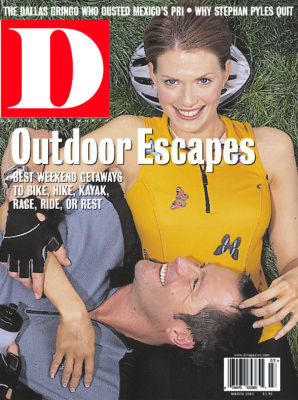Rob Allyn will never forget the first time he met Vicente Fox Quesada. He was in Monterrey, Mexico with the Dallas Assembly in May 1997 when their group heard a speech by Fox, then a state governor. Allyn, who had never heard of Fox, expected little more than platitudes. Instead, a Mexican version of John Wayne rose to give an eloquent presentation, in English, about a country ruled by a corrupt, self-perpetuating regime; a crippled economy that forces millions of Mexicans to seek work in other countries; and a dysfunctional school system that fails to give children the tools they need to build better lives. The speaker laid out a vision of Mexico unchained from the PRI.
Allyn was thunderstruck by Fox’s speech. “I remember thinking that he not only could be president of Mexico, but should be,” Allyn says. After the speech, a friend introduced Allyn to Fox. Allyn gave Fox a business card. “I told him I’d love to talk with him again,” Allyn remembers, “but I never expected to hear from him.” Two days later, Juan Hernandez, a professor at UT Dallas and a Fox advisor, called Allyn to tell him that Fox was thinking about running for president of Mexico. Hernandez asked if Allyn was interested in helping.
Starting in the summer of 1997, Allyn led a life of backdoor entrances and Spanish aliases as a media consultant to the colorful Fox, whose unorthodox campaign ignored the conventional wisdom about Mexican politics. Outside his company and his family, few knew of Allyn’s mid-life adventure. Allyn once wrote a line for Fox where he said Mexicans are the hardest working people on the planet, but they have been denied the fruits of their labor. “They’ve been systematically ripped off by their government for 71 years,” Allyn says. “The opportunity to help overturn that was incredible, because they deserve something better.”
Attending his first strategy session at Fox’s sprawling ranch in Guanajuato, Allyn saw that the Mexican leader possessed the same “aerobic” listening power that Joe Klein ascribes to the Bill Clinton character in Primary Colors. “I think that’s a character trait of really successful leaders,” Allyn says. “It’s not just their ability to deliver messages. They know how to absorb messages from others and make you feel important as they listen.” Something else about Fox made a strong impression on Allyn during that first meeting in the summer of 1997: his courtly manners. Because of some last-minute confusion, Allyn and Juan Hernandez arrived an hour-and-a-half late for what was supposed to be a breakfast meeting.
“Nobody had touched their food,” Allyn recalls. “Fox was a governor, soon to be a presidential candidate, and he was waiting for us. There’s not a city councilman or tax assessor-collector in the United States who would hold breakfast 15 minutes for a media consultant he hadn’t even hired yet.”
That same day, Allyn led Fox and his advisors through a six-hour seminar on the history of political advertising, showing clips of 1964’s infamous “daisy” spot for LBJ, a sampler of Lee Atwater’s attack ads, Ronald Reagan’s “Morning in America” glossies, the Clinton-Gore bus tour, and more. He drew up what media consultants call a message matrix, showing how Fox could define his candidacy and where opponents were likely to attack. At the time, Allyn says, he could barely order a cerveza in Spanish, so he didn’t catch Fox’s words when, halfway through the presentation, the governor leaned over and said something to Hernandez.
“I just figured I was boring him,” Allyn says. On the way back to the hotel, Allyn asked Hernandez what they thought of his spiel.
“Oh,” Hernandez said. “Didn’t you know? He said, ’Hire this guy.’”
While earning a degree in government from Georgetown University, where he studied under Madeleine Albright and Henry Kissinger, Allyn served as an aide to Jim Collins, who represented Dallas’s 3rd Congressional District until Steve Bartlett took over in 1982. In 1983, after a stint as a speechwriter for Texas Governor Bill Clements, Allyn founded his public relations company.
Since then, he has produced hundreds of TV, radio, print, and direct-mail pitches that have helped elect such Texas Republicans as Senator Phil Gramm, Congressman Mac Thornberry, Land Commissioner David Dewhurst, Supreme Court Justice Harriet O’Neill, and George W. Bush, in his first run for governor. Much of Allyn’s other work has been for large corporations such as Coca-Cola, Cinemark, GTE, and Sprint PCS. He masterminded media campaigns for DART, the downtown sports arena, the Trinity River Project, and the Dallas 2012 Olympic bid. Allyn has worked for the winning candidate in Dallas’ last five mayoral races.
Allyn thinks that his familiarity with business helped him click with Fox, who spent 15 years with Coca-Cola de Mexico, working his way up from route supervisor to president. Fox quit Coca-Cola in 1979 rather than move to Miami to be head of Coke’s Latin American operations. He then went into ranching and importing with his brothers before serving in Mexico’s Congress from 1988 to 1991. Fox was elected governor of Guanajuato in 1995.
“I’ve spent my life working for businessmen,” Allyn says. “There’s a mantra in Texas—’I’m a businessman, not a politician.’ I’ve written that line in a hundred ads and brochures. I think that background helped me understand Vicente.”
Once on board, Allyn found himself part of a talented and diverse campaign team. Hernandez handled scheduling; economist Eduardo Sojo, issues and speeches; Paco Ortiz, formerly of Procter & Gamble and Televisa, the advertising; Carlos Flores laid out strategy; Carlos Rojas had the difficult task of raising money for a campaign few thought could oust the PRI. As further proof that politics makes strange bedfellows, Allyn found himself sharing ideas with campaign adviser Jorge Castenada, the leftist intellectual and biographer of Cuban revolutionary Che Guevera. Castenada is now Mexico’s foreign minister.
“I don’t want to sound like we were organized, had a wonderful strategy, and were rolling in money,” says Hernandez, now director of immigrant affairs in Fox’s government. “We were throwing rocks at Goliath and running away. It was more like guerrilla warfare.”
Allyn helped to shape Fox’s message on television and in print. As he gained the candidate’s trust, he also lent a hand on speeches and helped prepare Fox for two crucial debates. But Allyn is quick to disavow any kingmaker role. “I was just one part of it in Fox’s mind,” he says. “He has tremendous political instincts. It’s like being the track coach for Michael Johnson. He lets you hold the stopwatch.”
Traditionally, Mexican presidential campaigns begin just six months before the election, when the PRI puts the dedazo, or finger, on its anointed candidate. Then the ruling party cranks up its usual campaign, flooding the airwaves with commercials; filling the streets with colorful comic books that extol the virtues of their man; and dispensing cash, food, and other prizes to supporters. While outright bribery and vote-buying have been curbed somewhat by reforms passed in the 1980s, the PRI still knows how to use its old tricks. SMU’s Carol Wilson, who studies Mexican voting behavior, attended several PRI rallies just before the election. She saw many people being given bicycles, bags of groceries, and other gifts to encourage loyalty to the PRI.
Fox, one of 32 Mexican governors, needed more time to get his name and ideas in front of the voters. So, risking charges of “un-Mexican” tactics, the Fox team decided to mount a precampagna, announcing his quest for the presidency two years earlier than any challenger had announced before. “Fox knew you couldn’t wrest power away from an institutional ruling party playing by their rules,” Allyn says. “Americans always look at these foreign elections kind of wistfully, like, isn’t it wonderful that people don’t have to endure two or three years of campaigning? But when you’ve had one-party, authoritarian rule for 71 years, who does a short campaign favor?”
Allyn immersed himself in Mexican history and culture, reading Octavio Paz’s The Labyrinth of Solitude and Enrique Krauze’s Mexico: A Biography of Power. Seeking to understand his new employer, he walked the grounds of Fox’s family estate, interviewed Fox’s farm hands, and paid a visit to Fox’s mother to sip lemonade and hear her reminisce about Vicente’s upbringing. At the same time, Allyn began what would become a three-year crash course in Spanish. “Unfortunately, I studied German in college,” he laughs. “I’ve probably got the worst grammar and the most extensive political vocabulary of anyone who ever learned Spanish on the fly.”
Despite his efforts at cultural osmosis, Allyn found that 20 years of work in American politics had not prepared him for every quirk of Mexican politics. One day he put several Fox press aides through a drill on handling tough questions from the media. At the end of his lecture, one of them said, “Thanks, but you never told us how much you usually pay a reporter for a story.”
At a meeting early in the campaign, some of Fox’s people asked Allyn for his thoughts on fundraising. “I said the real key to fundraising was to stroke the contributors,” Allyn says with a grin. “They like to see their names in lights and get close to the candidate. I said you’ve got to have a big gala, and be sure to list all their names in the program.” Allyn’s listeners broke out laughing. The PRI, he was told, kept close tabs on those who dared bankroll their opponents. Most fundraising had to be done in quiet, one-on-one meetings. Fortunately for challengers like Fox, Mexico has no disclosure laws, so well-heeled contributors can give without exposing their identities.
“If people had to go to a dinner or put their name in a program, they wouldn’t have given a nickel to Fox,” Allyn says. “That could have repercussions for your business.”
Fox never asked Allyn to work undercover, but Hernandez and Allyn agreed that it was smart. Fox aides feared voter backlash if it were widely known that hired gringos were helping Fox. Late in the campaign, PRI-friendly newspapers like El Universal caught on to Allyn’s role and tried to discredit him—despite the fact that the PRI candidate had hired James Carville and another former Clinton adviser, Stan Greenberg, to smooth his message.
“Rob was willing to work for democracy in Mexico in every way he could,” says Juan Hernandez, who adds that much of Allyn’s work was done pro bono. “But he’s not a Carville type who has to take center stage. In the shadows, in the background—sometimes that is the most effective way to help a country that is a friend of the United States but would like to keep a course of autonomy.”
Staying in the shadows wasn’t always easy in Mexico. At times, Allyn had trouble remembering which bogus identity the campaign had assigned him. “They’d vie to come up with the most absurd Spanish name for me to try to spell,” Allyn laughs. Standing 6-foot-4 and being of Scandinavian descent, he didn’t blend with the entourage around Fox. But as the campaign rolled on and Fox gained support, Allyn could more easily fade into the crowd.
While Allyn and the other Fox aides joked about assumed names—and the heads of lettuce that were heaved at their vans as they sped away from rallies—battling the PRI was serious business. According to Allyn, the PRI spied on the Fox campaign, constantly tapping their phones. When Hernandez had to call Allyn in Dallas, the two sometimes resorted to code words. If Fox was down seven points in the latest poll, the men would say that the Dallas Cowboys were behind by seven.
The Fox team often traveled in bulletproof cars, and the campaign staff held important meetings in what Allyn calls “safe houses.” One night when the Fox advisers met in a walled villa outside Mexico City, Allyn wandered down a hallway to look for a bathroom. Opening a bedroom door, he encountered several Fox bodyguards sitting on bunk beds, machine guns nearby.
Knowing they had to break with tradition to have any chance at victory, the Fox team did more than launch the precampagna. They also played up Fox’s brash, often bombastic personality, drawing a sharp contrast with the PRI candidate and a third-party candidate, both of whom were wooden and untelegenic. The 6-foot-6 Fox liked monogrammed boots, jeans, and open-collared denim shirts, so they stuck with the rugged-outsider look even while traditionalists feared he wouldn’t seem presidential. And, while Fox is a strong orator, the campaign opted for fewer traditional outdoor rallies, relying on television spots showing the candidate rolling up his sleeves, ready to work for the average Mexican.
Prepping for the all-important presidential debates in April, the Fox team took another page from the American playbook, bringing in surrogates to play the part of Fox’s rivals. Allyn butted heads with some of the inner circle when he and others urged Fox to speak from the heart to voters—a hackneyed device in the States, but groundbreaking stuff in Mexico. “This is not a debate between these candidates,” Fox would go on to tell voters. “This is a conversation between you and me about the future of our country.”
“I remember fighting over that line,” Allyn says. “Some thought it was too U.S. But when it went to Fox, he said it was good because he wanted to connect directly with people. All the others were talking to each other, but the real audience is at home.” It wasn’t the only time that Allyn clashed with some of Fox’s more traditional advisers. “They’d say, ’That isn’t the way we do it in Mexico,’ Allyn adds. “All I could say was, ’Yeah, but you always lose.’”
Fox scored well in the second and final debate in mid-May, but not before his hot temper plunged the campaign into crisis. Hoping to blunt Fox’s appeal, the PRI wanted a structured format with one moderator posing questions. The candidates would be allowed to speak for three minutes each and could not engage one other directly. Worse, the debate would only be carried live on two smaller channels, leaving most Mexican stations to air highlights during their newscasts. The PRI candidate, a short man, even quibbled about the height of the podium.
With their polls showing them leading, Fox aides believed they were in a position to make demands. They wanted a panel of questioners, and they insisted that the debate be carried live on all major networks. “This was vital to us,” Allyn says. “With the PRI controlling so much of the media, they could choose the sound bites and how to present the debate. Our only chance to break through was to go live like in the States.”
When negotiations stalled, the debate was canceled. Working until midnight on Saturday, Allyn wrote a two-minute TV spot in which Fox explained his demands and promised to debate anywhere, anytime—if his conditions were met. The commercial aired on Mexican TV the following day, but nobody budged. Allyn flew home to Dallas.
Then disaster struck. Two days later, in what Allyn calls an ambush, the PRI candidate and a third-party candidate invited Fox to an open meeting to discuss salvaging the debate. While live TV cameras hovered, the rivals demanded that Fox debate them on Friday. Fox boiled over, insisting that the debate be held that night, though no moderator was ready and no TV networks had committed to airing it.
“He started saying, ’Hoy,’ which means ’today,’ in that big, deep voice,” says Allyn, wincing. “He looked really belligerent. I mean he was pounding the table. He finally just walked out and said to forget it.” Mexicans didn’t like what they saw in the debate about debates. The media ripped Fox for what many called his tantrum, branding him intransigent, childish, and arbitrary. Overnight, Fox’s lead in the polls melted. Things grew bleaker after the PRI cut a quick TV spot showing the angry Fox barking “Hoy! Hoy!” To stop the bleeding, Fox’s staff had no choice but to okay the Friday debate. They had two days to get ready. A call went out to Allyn: Get back to Mexico fast.
At campaign headquarters, Allyn found the Fox team in disarray. Some advisers believed the candidate should apologize for the outburst, but Allyn disagreed. “One of the universal rules of politics is never try to be something you’re not,” he says. “If they attack you for something, see if there’s anything in there that can be used to your advantage. My thought was that stubbornness is a negative the way they’re using it, but it can be a positive when it comes to matters of principle. Think of Stonewall Jackson and Winston Churchill. That kind of stubbornness is a strength.”
By the time the debate started, Allyn and other advisers had come up with a gambit they hoped would halt the campaign’s slide. “Many people feel that in pushing for an open debate, I was too stubborn,” Fox began. “My mother always said that, growing up, I was too stubborn. But when you’re trying to overcome 71 years of poverty and corruption, you need someone who’s a little bit stubborn, someone of firm principles and strong character who will stand up and say what’s right.”
That bit of political judo disarmed Fox’s opponents. Gathering strength, the candidate even redeemed his hoy blunder, insisting that the country needed change, not next year, not next week, but today. Hoy. From that moment on, hoy became a slogan of the campaign.
“Fox ended up looking strong,” Allyn says. “That night, the flash polls showed us up four to five points again.”
Chris Tucker, former editor of D Magazine, is a Dallas writer, editor, and a commentator for KERA 90.1 FM. His work has appeared in the Dallas Morning News, The Progressive, Southwest Spirit, Travel & Leisure, and other publications.





